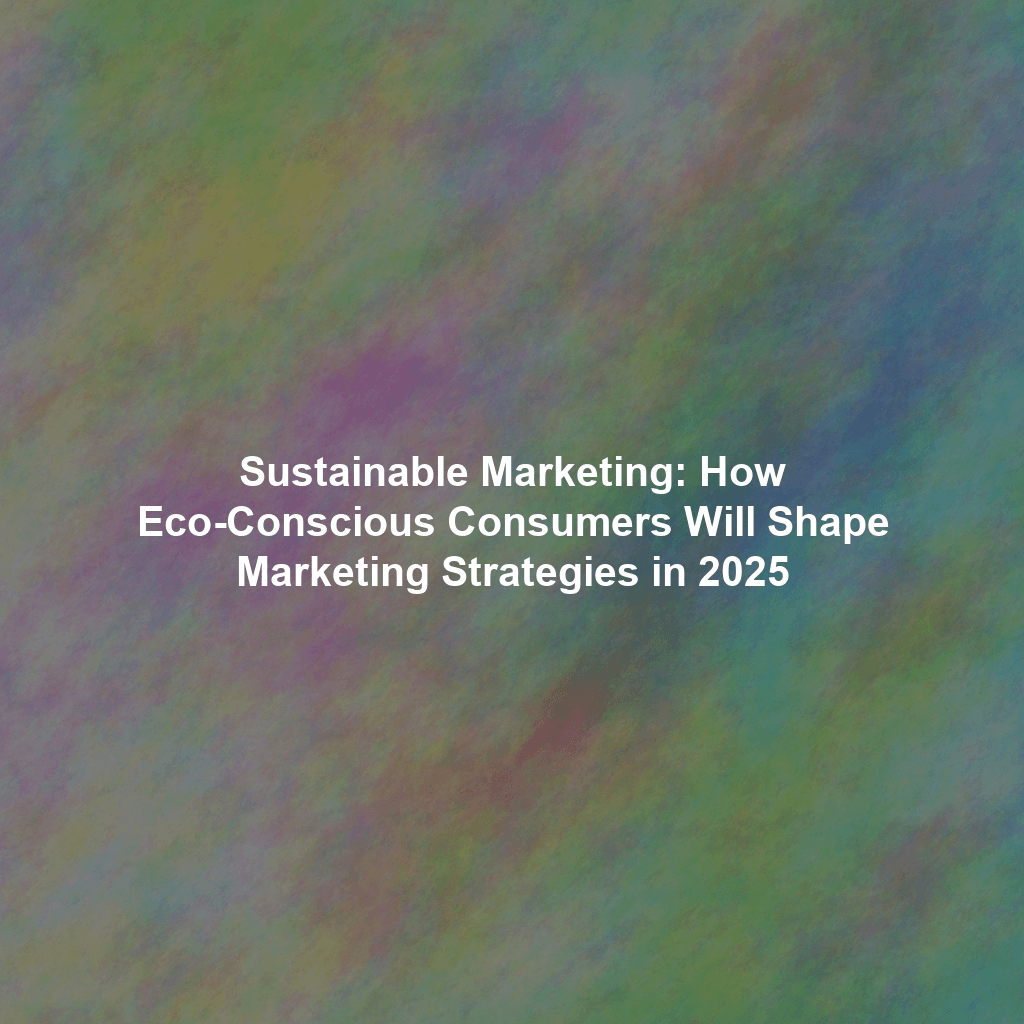The marketing landscape is constantly evolving, but one trend is poised to dominate in 2025: sustainability. Consumers, increasingly aware of the environmental impact of their purchases, are demanding eco-friendly products and ethical business practices. This shift is forcing brands to rethink their marketing strategies and embrace sustainability as a core value. This article delves into the growing importance of sustainable marketing, exploring the principles, strategies, and potential pitfalls that marketers need to navigate to succeed in the coming years.
The Rise of the Eco-Conscious Consumer
Consumer behavior is undergoing a fundamental change. No longer are price and convenience the sole drivers of purchase decisions. Environmental concerns, ethical sourcing, and social responsibility are now significant factors, particularly among younger generations. This eco-conscious consumer actively seeks out brands that align with their values and demonstrate a commitment to sustainability. They’re willing to pay a premium for products that are ethically produced, packaged sustainably, and contribute to a healthier planet. Expect this trend to intensify by 2025, making sustainable marketing not just a nice-to-have, but a must-have for brand survival.
Principles of Sustainable Marketing
Sustainable marketing goes beyond simply promoting “green” products. It’s an integrated approach that considers the environmental and social impact of all business activities. Here are some core principles:
- Customer Value-Driven: Focus on providing genuine value to customers while minimizing environmental impact. This means offering durable, repairable, and recyclable products.
- Societal Marketing: Consider the long-term well-being of society in all marketing decisions. This involves promoting responsible consumption and addressing social issues related to the industry.
- Environmental Stewardship: Minimize the environmental footprint of the business through efficient resource use, waste reduction, and responsible sourcing.
- Transparency and Authenticity: Be open and honest about your sustainability efforts. Avoid exaggerated claims and provide evidence to support your environmental claims.
Adapting Strategies for the Eco-Conscious Market
To effectively reach eco-conscious consumers in 2025, brands must adapt their marketing strategies to reflect their commitment to sustainability. This involves several key areas:
- Product Development: Design products with sustainability in mind, using recycled materials, reducing packaging, and extending product lifespan.
- Supply Chain Management: Ensure that the entire supply chain is ethical and environmentally responsible. This includes fair labor practices, sustainable sourcing, and reduced carbon emissions in transportation.
- Marketing Communication: Communicate your sustainability efforts clearly and transparently. Use storytelling to connect with consumers on an emotional level and highlight the positive impact of your products and practices.
- Partnerships: Collaborate with environmental organizations and other sustainable businesses to amplify your message and demonstrate your commitment to environmental causes.
Communicating Your Environmental Efforts Effectively
Communicating a brand’s sustainability efforts requires a delicate balance. Honesty, transparency, and concrete evidence are crucial. Here are some effective strategies:
- Third-Party Certifications: Obtain certifications from reputable organizations like B Corp, Fair Trade, or USDA Organic to validate your sustainability claims.
- Impact Reporting: Publish regular reports detailing your environmental and social impact. Include data on carbon emissions, waste reduction, and social initiatives.
- Storytelling: Share stories about the people and processes behind your sustainable practices. This helps to humanize your brand and build trust with consumers.
- Digital Marketing: Utilize digital channels to reach eco-conscious consumers with targeted messages. Optimize your website and social media content for search terms related to sustainability.
Leveraging Technology for Sustainable Marketing
Technology will play a crucial role in sustainable marketing by 2025. Blockchain technology can enhance supply chain transparency, allowing consumers to track the origin and environmental impact of products. AI-powered analytics can optimize marketing campaigns to reduce waste and improve targeting. Virtual reality and augmented reality can provide immersive experiences that showcase sustainable practices.
The Risks of Greenwashing
Greenwashing, the practice of exaggerating or falsely claiming environmental benefits, poses a significant threat to sustainable marketing. Consumers are becoming increasingly savvy at spotting greenwashing tactics, and brands caught engaging in this practice risk losing credibility and damaging their reputation. In 2025, the consequences of greenwashing will be even more severe as consumers demand greater transparency and accountability.
To avoid greenwashing, brands must ensure that their sustainability claims are accurate, verifiable, and relevant. Avoid vague terms like “eco-friendly” or “natural” without providing specific evidence to support your claims. Focus on transparency and be honest about the challenges you face in your sustainability journey.
Preventing Greenwashing
- Be Specific: Avoid vague terms and use concrete data and evidence.
- Be Transparent: Disclose all relevant information, even if it’s not entirely positive.
- Get Certified: Seek third-party certifications to validate your claims.
- Avoid Exaggeration: Don’t overstate the environmental benefits of your products or practices.
Conclusion: A Sustainable Future for Marketing
Sustainability is no longer a niche trend; it’s a fundamental shift in consumer values and business practices. By 2025, brands that embrace sustainable marketing principles will be the ones that thrive. By focusing on customer value, environmental stewardship, and transparent communication, businesses can build trust with eco-conscious consumers and create a more sustainable future for all. The key takeaway is that authentic commitment and demonstrable action will be paramount, as consumers become increasingly discerning and hold brands accountable for their environmental promises.
 Skip to content
Skip to content